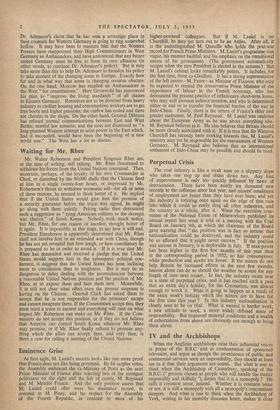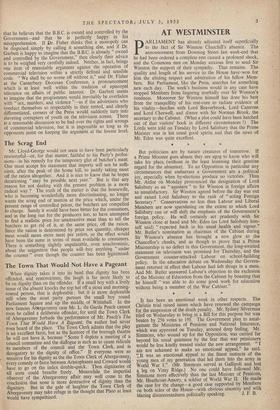TV and the Archbishops
When the Anglican archbishops raise their influential voices in praise of the B.B.C.' and in condemnation of sponsored television, and argue as though the co-existence of public and commercial services were an impossibility, they should at least see to it that their arguments are sound. But what is one to think when the Archbishop of Canterbury, speaking of the B.B.C. (" persons chosen as people who will handle the matter responsibly and skilfully "), denies that it is a monopoly ? He calls it common sense, instead. Whether it is common sense or not, it is still a monopoly with all a monopoly's concomitant dangers. And what is one to think when the Archbishop of York, writing in his monthly diocesan letter, makes it clear that he believes that the B.B.C. is owned and controlled by the Government—and that he is perfectly happy in his misapprehension. If Dr. Fisher thinks that a monopoly can be disguised simply by calling it something else, and if Dr. Garbett is happy to imagine that the B.B.C. is already " owned and controlled by the Government," then clearly their advice is to be weighed very carefully indeed. Neither, in fact, brings one item of reasonable argument against the operation of commercial television within a strictly defined and sensible code. " We shall be no worse off without it," said Dr. Fisher at the Canterbury Diocesan Conference, a pronouncement which is at least well within the tradition of episcopal utterance on affairs of public interest. Dr. Garbett seems to imagine that the programmes would inevitably be overladen with " sex, murders, and violence "—as if the advertisers who Conduct themselves so respectably in their rented, and clearly differentiated, corners of the Press would suddenly turn into slavering corrupters of youth on the television screen. There is a reasonable discussion to be had over the rights and wrongs of commercial television, but it is impossible so long as its opponents insist on keeping the argument at the lowest level.



























































 Previous page
Previous page